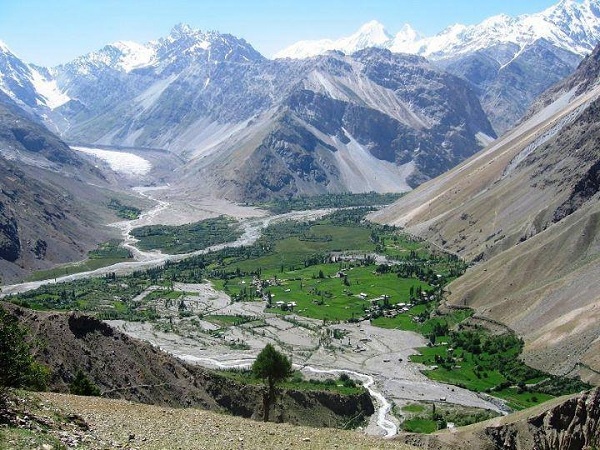New Delhi, (Samajweekly) The controversial proposal to annex Gilgit-Baltistan region of Pakistan-occupied Kashmir (PoK), which is to change the semi-autonomous status of the region, is being pushed by Pakistan to help China secure the China-Pakistan Economic Corridor (CPEC), security agencies have told the government. India is opposing the proposed move.
The developments in Pakistan related to Gilgit-Baltistan and diminishing role of terrorist leaders and separatists operating against India is not just accidental. It has massive strategic depth and the security perimeter around it with China playing a major role.
Arguably the most important factor, top security officials said, is increasing interference of China in Pakistani affairs with a long-term focus.
The 3,218-kilometre CPEC, a dream project of Chinese President Xi Jingping, in which China has sunk about USD 19 billion, runs along the disputed area.
Last August Prime Minister Narendra Modi scrapped special status of Jammu & Kashmir bringing it under federal control. Statements reiterating India’s claim over the Gilgit-Baltistan are believed to have sparked further apprehension about Gilgit-Baltistan.
There were three meetings in Islamabad to end the autonomous status of Gilgit-Baltistan. As the meetings were happening in Pakistan, the security agencies underline Chinese started incursions in eastern Ladkah region.
Sources detailing the manoeuvres said that the first meeting was held last year in Islamabad and it was presided over by Pakistan’s top army officers. In the meeting, Kashmiri separatists leaders based in Pakistan were called in to discuss the issue to annex Gilgit-Baltistan with Pakistan.
The Kashmiri separatists shot down the proposal. This irked the Pakistan Army and Inter-Services Intelligence.
Subsequently, the third meeting was held in February 2020 and it was presided over by another top Pakistan Army officer. The meeting was also attended by Pakistan’s law minister, PoK law minister, PoK Prime Minister, Gilgit-Baltistan Chief Minister, both factions of Hurriyat and Jammu Kashmir Liberation Front (JKLF) representatives.
In the meeting, a detailed presentation by Pakistan Army on the history of Gilgit-Baltistan was made wherein it was stated it was never part of Jammu & Kashmir and was forcibly annexed by Dogra Maharaja and British. The Hurriyat leaders supported the idea. However, JKLF nominee and Kashmir-based SAS Geelani’s representative remained quiet.
Geelani’s representative is reported to have opposed the proposal after seeking clarification and direction from Srinagar.
Sources said that 90-year-old Geelani based in Srinagar had directed to oppose it tooth and nail. Further, Geelani’s representative refused to endorse other Hurriyat leaders’ decisions about Gilgit-Baltistan. Geelani’s representative is reported to state that annexation of Gilgit-Baltistan would hurt the militancy movement in Kashmir.
The JKLF nominee also voiced apprehension on the proposal. “The meeting was then adjourned without any final decision,” said sources.
Geelani had earlier opposed then Pakistan President Pervez Musharraf’s four-point formula also and because of it Islamabad and PoK offices were shut down.
After this meeting, a series of events took place that led to a revolt against Geelani’s representative and he was removed from his position.
Seeing this, Geelani’s representative, who was a former Hizbul Mujahideen commander and had made forays in politics, sought support from separatists opposed to ISI machinations.
They formed a six-member core group without a name, which is a separate organistion and also against Hurriyat. It included representative of JKLF Rafiq Dar, Hurriyat Mirwaiz group Faiz Naqashbandi, Hizbul commander Salahudin, Jamat e Islami representative Nabi Nowshari. The group is said to have the backing of PoK Prime Minister Raja Farooq Haider.
Then the ISI started acting against them. The first was the attack on Hizbul Mujahideen chief and most wanted terrorist Syed Salahuddin. The Kashmiri leadership was peeved by the ISI, which has been funding the terror outfit and sheltering Salahuddin, for not doing anything after India’s scrapping of Article 370 last year.
In May this, an explosion took place at Salahuddin house in Islamabad. It is said a hand grenade was lobbed at his house to send him a message. In police FIR it was mentioned as cooking gas cylinder blast. The attack at Salahuddin house in May was a coded message that he was no longer a poster boy of Rawalpindi.
And then came the resignation of Geelani from Hurriyat Conference. Although, in his audio message, Geelani cited the current state of the Hurriyat Conference to disassociate himself from the forum, there was a shadowy war behind the move.
Explaining the shadowy war, sources said that those militants who had gone to PoK and stayed there since 1990s are not a fighting force anymore. “They are seeking a role in political affairs. Hurriyat leadership is not allowing them, since they have developed vested interests. They are not vacating their positions,” said sources adding that Geelani has been backing the former Hizbul cadre, who want a political space within Hurriyat.
“The old hawks occupying the top positions are not allowing the younger lot to join. Also, in PoK, many separatists’ leaders are living a luxurious life, which is also being resisted by the younger lot. They had even complained to Geelani against the old Hurriyat leaders based in PoK,” sources further added.
India closely watches these developments and has strongly opposed the move of Pakistan to make changes in Gilgit-Baltistan. India has always maintained that the entire Gilgit-Baltistan and PoK is part of India’s territory and illegally occupied by Pakistan.
In a strong-worded statement India said such cosmetic exercises are intended to camouflage Pakistan’s illegal occupation of Indian territories.
Top sources said the move would serve China’s geostrategic agenda and diminishing power of separatists will provide Chinese People’s Liberation Army to strengthen its foothold in PoK and Gilgit-Baltistan and ultimately, treat it like Chinese provinces.
China and Pakistan, which has been using terrorists against India, have a single aim – to convert the geopolitical stability in the region to turmoil on another front away from Ladakh.










